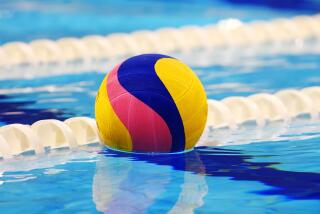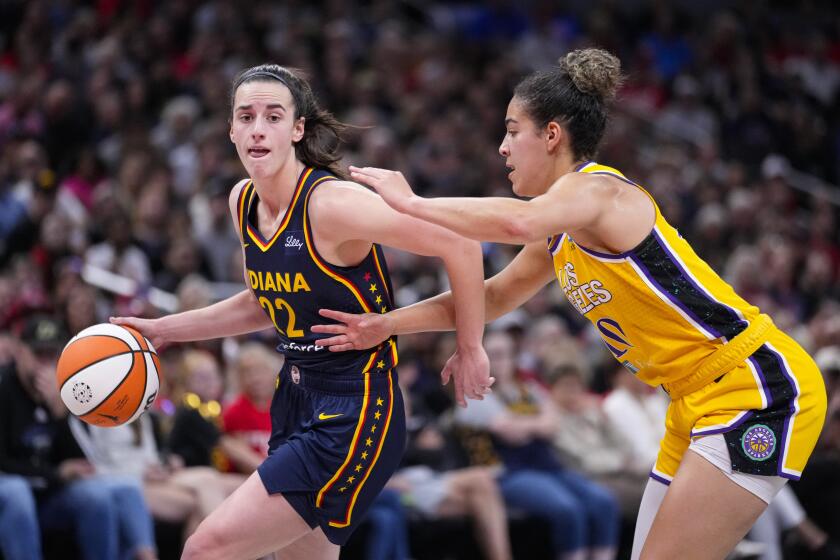A Very Unlikely Setting for the Rich Man’s Game
It’s Friday night in Anaheim. Actually it’s the first Friday of the month and that means there’s going to be a traffic jam on State College Boulevard.
This is cruise night. Car enthusiasts and curious teen-agers hub around Angelo’s--a hamburger joint where you can get a cherry cola served at your car by a waitress on roller skates. Nothing much actually goes on, the people are just, well, cruising.
“People come from as far away as L.A. County,” according to Sgt. Steve Brace of the Anaheim Police Department.
But cruising isn’t the only game in town on this night. Only a drag race away down State College there are other horsepower enthusiasts. They are the members of the Winston Polo Club. Only a year old and struggling to survive, the club is based at Anaheim’s Anaco Ranch, which is in the shadow of Anaheim Stadium to the south and next door to an industrial storage park.
This is not exactly the type of locale associated with the sport. After all, Anaheim is not the Meadow brook Club at Westbury, Long Island.
Polo. It’s people with wallets the size of the great outdoors playing on large grass fields.
Polo. It’s dashing men astride dashing horses.
It’s a sport of leisure. A sport of royalty. A sport most of us know little about.
But the image is changing with the help of the Winston club and others across the country like it.
“People expect big grass fields and a lot of rich people running around,” Anaco Ranch manager Judith Baker said. “They’re pretty surprised to see this is all it is.”
What they see is commoners enjoying the game in the name of good horsemanship.
On a recent Sunday afternoon the Winston Polo Club was getting thumped. Playing in a round-robin tournament the club was hosting, the team is no match for the more experienced Malibu club. Winston loses, 11-2.
Moorpark takes the next turn in beating Winston, 13-1.
Polo instructor Kim Kelly says the play is less than exemplary--she hides her head in her hands for most of the match, embarrassed at some of her pupils’s maneuvers--but the players don’t seem to be discouraged. Many of them are learning to ride horses as they learn the game. It’s all part of the fun.
“It can be frustrating at times to work with people,” Kelly said. “But everyone tries so hard. It’s hard to get mad at anyone who’s trying their best.”
It was Kelly who persuaded Baker to try polo last year, and since then the club has grown, not quickly, but at a steady pace.
“Some people are still put off by polo,” Baker said. “They still think it can only be played if you’re rich. What we’re trying to show here is that you don’t have to have a whole lot of money to play. Once we get people out here, they’re hooked. I’ve tried a great number of sports but polo is unquestionably the most exciting.”
Kelly, who started a successful women’s program at UC Davis, found just watching the sport to be fascinating
“Some friends and I would go out and watch the men’s team play and we loved it,” Kelly said. “We decided we wanted to get our own team together. We asked the school for some help but it refused. So we just put it together on our own”
Kelly’s little do-it-yourself team won the Women’s Intercollegiate Polo championship in 1978, its first season. Since then, Davis has won every title except one.
If the play Kelly coaches today is less than elite, so are the prizes.
Instead of silver trophies and platters, the tournament’s rewards are straight out of “Let’s Make A Deal.”
Toaster ovens, computer software, acrylic nails . . . these are the spoils of the sport.
Actually they are not the prizes for winning, but part of an auction the club sponsors to raise money.
Baker is a jolly person, always quick with a laugh, a quality she needs because the calls come every day from real estate interests who would like to buy the ranch, located on prime industrial property.
“I saw an article that said this land is some of the most valuable right now in Orange County,” Baker said.
Indeed, next door to the Anaco Ranch an industrial storage park has just been constructed causing Baker to wonder if the ranch might not be next.
“I get a call every Monday from bankers. I just say ‘Thank you it’s not for sale.’ ”
Baker--a native of England--has run the ranch for 10 years. For nine of those years her teaching was confined to show jumping where her expertise was well known. She competed for Great Britain in countless international meets.
She manages the property for the owner, the Anaco Steel Co. Baker says she wonders if someday the company might decide to foreclose.
“That’s why it’s so important that polo catches on,” she said. “The more people get interested in the sport, the more we can show the owners their land is not being wasted.”
The participants of Orange County polo would seem to be proof positive that the land is being put to a worthwhile use.
“You don’t mind if you’re not the greatest because this is just so much fun to play,” Newport Beach attorney Martin Joseph said. “I’ve participated in all types of sports but this is the best.”
The sentiment is echoed time after time by Winston’s members who claim they’ve tried the rest and have now found the best.
“I think the secret lies in the horse,” Dr. Richard Foxx said. “This is a true team sport. You depend on your horse and when things are right, you become almost one being.”
Said Newport Beach lawyer Denny Geiler: “Sometimes I swear the horse knows what I’m thinking. I’ll see the ball go one way and even before I can start to move, Mac (Geiler’s horse) will react. It’s spooky. But there’s nothing else like it.”
The horses. Ask the people and they’ll tell you that’s the real secret to polo. The best players such as international star Memo Gracida are expert riders.
And to stay competitive in the game can take a lot of hay. Horses become exhausted after a 7 1/2-minute chukker (period), and it’s unhealthy to allow one horse to play two consecutive chukkers. So, the elite player simply jumps off one horse at the end of a period and jumps on another. The outdoor athletes--big-time polo players--usually have a stable of horses at their beckoning.
Winston’s members are not quite that serious, and most do not have the means to care for a stable of horses. Therefore, they take the horses they have much more to heart. For many, the decision to get a horse was made at the expense of a second car or an addition to the house. Besides playing polo, most use their horses for recreational riding.
“I think if you’re an outdoor rider and you have a whole stable of horses you don’t appreciate the horse like we do,” Geiler said. “Mac is like a member of the family.”
Geiler, like many new polo enthusiasts, is looking to expand his family.
“Don’t tell my wife, but I’m looking for another horse,” Geiler joked.
Said Kelly: “These players get hooked on the game and they want to play more. The only way you can play more is if you have another horse.”
The size of the field also determines the type of rider that can play. Kelly says anyone who learns to play arena polo can easily make the transition to outdoor. But not vice versa.
“Because the playing field is so much smaller in arena you have to be more of a horseman,” Kelly said. “You have to be able to stop quickly and turn your horse around much quicker. In outdoor, the field is large that you can gallop forever.”
What you gallop with also is different. Outdoor players exclusively use thoroughbreds because they are prized for their stamina. But the arena game is more or less an equestrian cocktail mixture. There is a breed--part quarter horse and part thoroughbred--that is thought to be the best, but on any given day at the ranch there are Appaloosas, Arabians, etc. Save the Scottish Clydesdales, practically every type of horse is usable.
But the horses are much more than useful animals. Like Geiler, most of the owners include the horse as part of the family. Horses are petted and kissed constantly by their owners. During a match, a player could hit another player with his mallet and nothing much would be said. But let a player so much as crease a horse’s leg and players and spectators alike become indignant.
“It’s incredible the love these people have for their horses,” Baker said. “It’s the funniest thing you’ve ever seen to watch all these lawyers, doctors and businessmen dressed up in their three-piece suits come down and feed carrots to their horses. They talk to them. They really get attached to the animal.”
Foxx, a Newport Beach obstetrician, believes the time spent with horses is therapeutic.
“I think it provides a distraction for people who have a lot of pressures on their minds,” Foxx said. “I know there’s been research done with the calming effect animals have on humans.”
Foxx should know. He is somewhat of the club team physician. He wears his hospital pager while playing and more than once has been beeped right out of a match.
“Richard plays a little, delivers a baby and then comes back to play a little more,” Baker joked.
Said Foxx: “Oh, I know they say that, but I would never come out here if something was serious back at the hospital. I’ve been stopped a few times while I’m playing but everyone just stops for a second while I find out if it’s anything serious.”
Though Kelly says a horse can be purchased for about $3,500, that still represents a substantial investment compared to a tennis racket or a pair of high-top basketball shoes. So, is it true that even in arena polo only the rich can participate?
“I don’t think polo is just a game for the rich,” protested Roberto Romo of Acapulco and Newport Beach.
He then handed his polo helmet to his maid and walked away.
More to Read
Go beyond the scoreboard
Get the latest on L.A.'s teams in the daily Sports Report newsletter.
You may occasionally receive promotional content from the Los Angeles Times.










